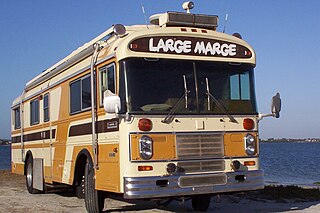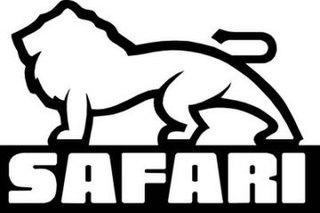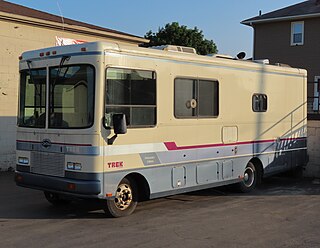GMC is a division of American automotive manufacturer General Motors (GM) for trucks and utility vehicles. GMC currently makes SUVs, pickup trucks, vans, and light-duty trucks. In the past, GMC also produced fire trucks, ambulances, heavy-duty trucks, military vehicles, motorhomes, transit buses, and medium duty trucks.

Hindustan Motors is an Indian automotive manufacturer based in Kolkata. It is a part of the Birla Technical Services conglomerate. Hindustan Motors was the largest car manufacturer in India before the rise of Maruti Udyog. Hindustan Motors manufactured the Ambassador and Landmaster motorcars, both immensely popular Indian automobiles from 1957 to 2014.

Motor Coach Industries (MCI) is a North American multinational bus manufacturer, specializing in production of motorcoaches. Best known for coaches produced for intercity transit and commuter buses, MCI produces coaches for a variety of applications, ranging from tour buses to prison buses.

Forest River Inc. is an American manufacturer of recreational vehicles, cargo trailers, utility trailers, pontoon boats, and buses.

Daewoo Motors was a South Korean automotive company established in 1937 as "National Motors". The company changed its name several times until 1982 when it became "Daewoo Motors" following its acquisition by the Daewoo Group. After running into financial difficulties, it sold most of its assets in 2002 to General Motors at $1.2 billion, becoming a subsidiary of the American company. In 2011, the name "Daewoo" was definitively removed with the company being renamed GM Korea and the Daewoo brand replaced by the Chevrolet marque.

A motorhome is a type of self-propelled recreational vehicle (RV) which is as the name suggests, like a home on wheels.

Navistar International Corporation is an American holding company created in 1986 as the successor to International Harvester. Navistar operates as the owner of International-branded trucks and diesel engines. The company also produces buses under the IC Bus brand. On July 1, 2021, Navistar became a wholly owned subsidiary of Traton, and therefore part of the Volkswagen Group.
Prevost, formally known as Prevost Car, is a Canadian manufacturer of touring coaches and bus shells for high-end motorhomes and specialty conversions. The company is a subsidiary of the Volvo Buses division of the Volvo Group.
Superior Coach was a coachbuilder in the American automotive industry. Founded in 1909 as the Garford Motor Truck Company, Superior is best known for constructing bodies for professional cars (hearses) and school buses. Following major downturns in both segments in the late 1970s, Superior was liquidated by its parent company in 1980. From 1925 to 1980, the company was based in Lima, Ohio.
American Transportation Corporation was an American manufacturer of school bus bodies. Tracing its roots to Ward Body Works, AmTran was formed in 1980 following the 1979 bankruptcy of Ward to continue bus production. In 1991, the company became a subsidiary of Navistar International, leading to a series of acquisitions of school bus body manufacturers by chassis suppliers during the 1990s.

Thor Industries, Inc. is an American manufacturer of recreational vehicles (RVs). The company sells towable and motorized RVs through its subsidiaries brands including Airstream, Heartland RV, Jayco, Livin Lite RV, and others. The company's headquarters is in Elkhart, Indiana. It has manufacturing facilities in Michigan, Ohio, Indiana, Idaho and Oregon.

Monaco is a recreational vehicle (RV) brand, manufactured in Decatur, Indiana, and wholly owned by REV Recreation Group. Monaco holds a portfolio of Class A diesel motorhomes. REV Recreation Group is a subsidiary of REV Group.

Holiday Rambler Corporation is an American corporation which primarily manufactures recreational vehicles. It was founded in 1953. In 1961, Holiday Rambler’s introduction of aluminum body framing ushered in a new era of lighter, stronger and more durable recreational vehicles (RVs). This aluminum frame (Alumaframe) became the standard for lighter and stronger RVs for 40 years. Holiday Rambler was also responsible for many firsts; built-in refrigerators, holding tanks and aerodynamic radiused corners. As Holiday Rambler moved into motorhomes, they were the first with tag axles and the kitchen slide-out revolutionized "interior engineering" in the field. Holiday Rambler was sold to Harley-Davidson in 1986 and later in 1996 to the Monaco Coach Corporation where its future, then under Navistar International Corp., was difficult in 2010 as it was for most motorhome manufacturers.

Wanderlodge is a retired series of recreational vehicles built by American bus manufacturer Blue Bird Body Company. Introduced as the Blue Bird Transit Home in 1963, the Wanderlodge was a derivative of the Blue Bird All American school bus for over year; two further generations were produced, adapting motorcoach body and chassis design.
The Wayne Lifestar is a product line of buses that was manufactured and marketed by Wayne Corporation and its successor company Wayne Wheeled Vehicles from 1986 to 1995. Produced nearly exclusively in a school bus configuration, the Wayne Lifestar used a transit-style body configuration with a front-engine chassis. Marking the return to transit-style production, the Lifestar adopted the single-piece body stampings of the Wayne Lifeguard in its construction.
Wayne Wheeled Vehicles (WWV) was a tradename of a division of a vehicle manufacturer that specialized primarily in the production of school buses. It was owned by Harsco Corporation, who purchased the rights to use the Wayne brand name, certain product rights, as well as parts and tooling during the liquidation of assets of the Wayne Corporation in late 1992.

REV Group, Inc. is an American manufacturer of ambulances, buses, commercial vehicle, firefighting vehicles, recreational vehicles and other specialty vehicles, as well as aftermarket parts and services. It provides vehicles and services for public fire departments and emergency services, as well as commercial infrastructure and leisure vehicles for consumers.

Safari Motorcoach Corporation is a defunct American motor coach manufacturing company that was based in Oregon. The company's manufacturing plant was initially located in Harrisburg. The Safari Coach brand name was purchased by Monaco in 2002, however the Safari Coach name was no longer being used as of 2009.

The Safari Trek was a line of Motorhomes built by the Safari Motorcoach Corporation (SMC) based out of Harrisburg, Oregon. The Trek line was developed in the late 1980s with some early model prototypes. The first official model year began in 1991 and ended in 2001 under the Safari Motorcoach Corporation banner. In 2001 SMC was purchased by Monaco Coach who took over the production of subsequent model years. The early pre-Monaco Trek's now hold a venerated status among Safari RV enthusiasts-"Trekkies". This is in part due to the Trek's patented "Electro-Majic Bed" which provided for spacious floor plans. There was as well an exceptionally high build quality that used a riveted aluminum outer skin in lieu of the more popular tin or fiberglass, real hardwood cabinetry, and a small bus like design that made the Trek easy to drive and maneuver. In 2009 Monaco Coach filed for chapter 11 bankruptcy ending the "Safari Trek" line of motorhomes. The exact production numbers of the early pre-Monaco Treks have never been officially released, but estimated to be approximately 200 per year at peak production during the ten-year run. Much of this is derived from former employees and customers who took the factory tours that Safari Motorcoach Corporation would give to potential buyers. Since there is no official registry, it is difficult to know how many are still on the road today.
Pontiac West Assembly was a General Motors manufacturing facility located in Pontiac, Michigan. The manufacturing complex occupied an irregular 82-acre site bounded on the North side by Rapid Street, on the South side by South Boulevard W, on the East side by the Grand Trunk Western Railroad/Woodward Avenue, and on the West side by Franklin Road. The complex included GMC Truck & Coach Plant 1, 3, 4 and 5, as well as numerous administrative and support buildings. The last GM operations at the facility were closed, and the site completely demolished, in 2008.













